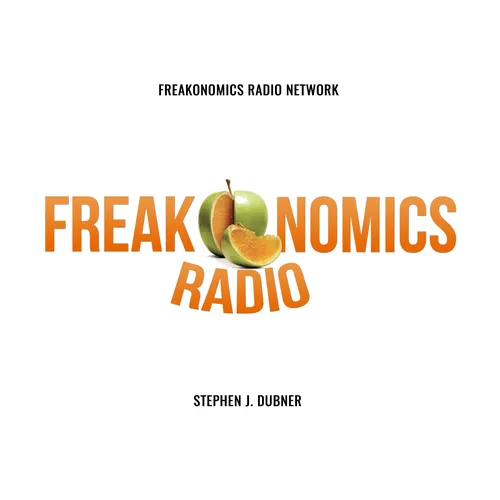
Freakonomics Radio
Freakonomics co-author Stephen J. Dubner uncovers the hidden side of everything. Why is it safer to fly in an airplane than drive a car? How do we decide whom to marry? Why is the media so full of bad news? Also: things you never knew you wanted to know about wolves, bananas, pollution, search engines, and the quirks of human behavior.
To get every show in the Freakonomics Radio Network without ads and a monthly bonus episode of Freakonomics Radio, start a free trial for SiriusXM Podcasts+ on Apple Podcasts or by visiting siriusxm.com/podcastsplus.
- Update frequency
- every 5 days
- Average duration
- 41 minutes
- Episodes
- 857
- Years Active
- 2010 - 2025

269. Bad Medicine, Part 2: (Drug) Trials and Tribulations
How do so many ineffective and even dangerous drugs make it to market? One reason is that clinical trials are often run on "dream patients" who aren't representative of a larger population. On the ot…

268. Bad Medicine, Part 1: The Story of 98.6
We tend to think of medicine as a science, but for most of human history it has been scientific-ish at best. In the first episode of a three-part series, we look at the grotesque mistakes produced by…

The No-Tipping Point (Rebroadcast)
The restaurant business model is warped: kitchen wages are too low to hire cooks, while diners are put in charge of paying the waitstaff. So what happens if you eliminate tipping, raise menu prices, …

267. How to Make a Bad Decision
Some of our most important decisions are shaped by something as random as the order in which we make them. The gambler's fallacy, as it's known, affects loan officers, federal judges -- and probably …

Introducing Stephen J. Dubner's new podcast, "Tell Me Something I Don't Know"
"Tell Me Something I Don't Know" is a live game show hosted by Stephen J. Dubner of "Freakonomics Radio." He has always had a mission: to tell you the things you thought you knew but didn't, and thin…

266. Trust Me
Societies where people trust one another are healthier and wealthier. In the U.S. (and the U.K. and elsewhere), social trust has been falling for decades -- in part because our populations are more d…

How Much Does the President Really Matter? (Rebroadcast )
The U.S. president is often called the "leader of free world." But if you ask an economist or a Constitutional scholar how much the occupant of the Oval Office matters, they won't say much. We look a…

265. The White House Gets Into the Nudge Business
A tiny behavioral-sciences startup is trying to improve the way federal agencies do their work. Considering the size (and habits) of most federal agencies, this isn't so simple. But after a series of…

264. In Praise of Incrementalism
What do Renaissance painting, civil-rights movements, and Olympic cycling have in common? In each case, huge breakthroughs came from taking tiny steps. In a world where everyone is looking for the ne…

263. In Praise of Maintenance
Has our culture's obsession with innovation led us to neglect the fact that things also need to be taken care of?

262. This Is Your Brain on Podcasts
Neuroscientists still have a great deal to learn about the human brain. One recent MRI study sheds some light, finding that a certain kind of storytelling stimulates enormous activity across broad sw…

How To Win A Nobel Prize (Rebroadcast)
The process is famously secretive (and conducted in Swedish!) but we pry the lid off at least a little bit.

261. Why Are We Still Using Cash?
It facilitates crime, bribery, and tax evasion -- and yet some governments (including ours) are printing more cash than ever. Other countries, meanwhile, are ditching cash entirely. And if Star Trek …

260. Has the U.S. Presidency Become a Dictatorship?
Sure, we all pay lip service to the Madisonian system of checks and balances. But as one legal scholar argues, presidents have been running roughshod over the system for decades. The result? An accum…

259. Ten Signs You Might Be a Libertarian
Gary Johnson, the Libertarian Party's presidential candidate, likes to say that most Americans are libertarians but don't know it yet. So why can't Libertarians (and other third parties) gain more po…

258. Why Uber Is an Economist’s Dream
To you, it's just a ride-sharing app that gets you where you're going. But to an economist, Uber is a massive repository of moment-by-moment data that is helping answer some of the field's most elusi…

257. The Future (Probably) Isn’t as Scary as You Think
Internet pioneer Kevin Kelly tries to predict the future by identifying what's truly inevitable. How worried should we be? Yes, robots will probably take your job -- but the future will still be pret…

Are You Ready for a Glorious Sunset? (Rebroadcast)
The gist: we spend billions on end-of-life healthcare that doesn’t do much good. So what if a patient could forego the standard treatment and get a cash rebate instead?

Aziz Ansari Needs Another Toothbrush (Rebroadcast)
The comedian, actor -- and now, author -- answers our FREAK-quently Asked Questions.

256. What Are You Waiting For?
Standing in line represents a particularly sloppy - and frustrating - way for supply and demand to meet. Why haven't we found a better way to get what we want? Is it possible that we secretly enjoy w…